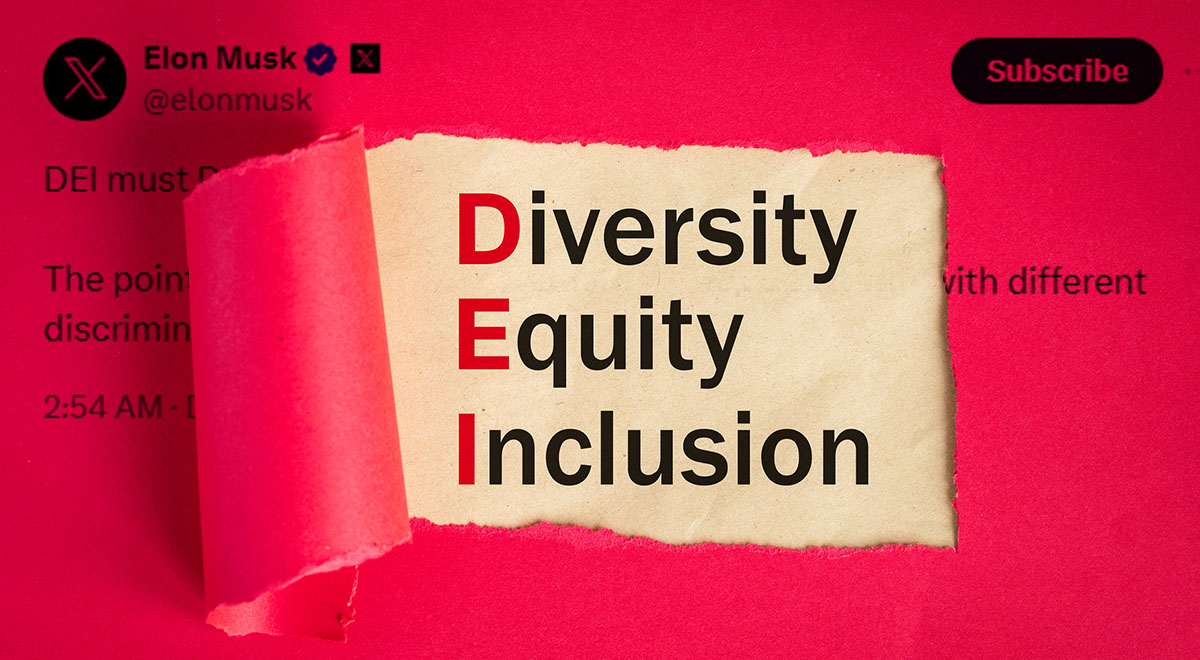
Research shows DEI should DIE
By David Millard Haskell
Almost two months ago, Tesla CEO and Twitter (now X) owner Elon Musk, made critical statements on X about the field of diversity, equity, and inclusion (DEI). In a post that’s now been viewed nearly 36 million times, Musk stated “DEI must DIE. The point was to end discrimination, not replace it with different discrimination.”
Recently, Musk showed he was willing to do his part to hasten DEI’s demise. In its official filings with the US Securities and Exchange Commission, Tesla did a clean sweep of DEI language and references to DEI initiatives. The world’s largest electric vehicle manufacturer is now DEI-free.
Musk’s comment and related actions reflect a growing consensus that DEI ideology and instruction—educational materials steeped in critical social justice and offered as mandatory training by most corporations, educational systems and government agencies—does not work.
That is, it fails to deliver on its promise to reduce prejudice and produce greater harmony among groups. Ironically, as Musk observes, it appears to promote the divisive concept popularized by self-proclaimed “anti-racism” scholar and DEI guru, Ibram X. Kendi, that “the only solution to past discrimination is present discrimination.”
In the US, several high-profile controversies have further solidified the connection between questionable concepts (like Kendi’s) promoted in DEI training and reverse discrimination against Caucasians as well as academically successful Asians, and Israel-supporting Jews.
There have been similar DEI-influenced controversies in Canada. The suicide of Toronto public school principal Richard Bilkszto awakened many to the destructive nature of this caustic curriculum. When announcing his death, Bilkszto’s lawyer traced his deteriorating mental health and ultimate demise to a series of diversity, equity and inclusion workshops he had attended. (The allegations have not yet been proven in court.)
Recordings show that Bilkszto was subjected to repeat harassment and humiliation based on his skin colour after he politely questioned the DEI trainer about one of her claims.
Shortly after Bilkszto’s death in July of 2023, the trainer in question, Kiki Ojo-Thompson, released a statement on the website of her consulting company, the KOJO Institute. It said: “This incident is being weaponized to discredit and suppress the work of everyone committed to diversity, equity, and inclusion” which is “building a better society for everyone.”
But is it true that the concepts and training of DEI builds “a better society for everyone?”
This was a question that the Aristotle Foundation for Public Policy asked me to answer. To do that I examined the findings of the most significant DEI studies from recent decades published in top social scientific journals like the Annual Review of Psychology, Anthropology Now, Journal of Experimental Psychology, Psychological Science, and Journal of Personality and Social Psychology. Authors of the reviewed literature are from various universities including Harvard, Princeton, Yale, Michigan, Syracuse, Aberdeen and others.
What the research shows is surprising—for some. For example, claims that “DEI works!” are not supported; multiple meta-analyses of hundreds of studies could not discern any clear evidence that DEI instruction changes people’s attitudes for the better.
In one particularly damning analysis, the researchers concluded “Implementation of DT [Diversity Training] has clearly outpaced the available evidence that such programs are effective in achieving their goals.”
On the other hand, the research provides clear proof: DEI instruction can activate and even increase bigotry among participants.
You’d think that such a conclusion would cause our corporate, academic, and political leaders to immediately withdraw the millions they’re spending on DEI programs and DEI staff. But old habits die hard, especially when those enforcing the habits have to admit that they’ve been hoodwinked.
The practice of blood-letting lasted more than one thousand years and only began to fall out of fashion in the mid-1800s when a Parisian physician, Pierre Louis, finally decided to measure patient outcomes. To his surprise, the application of leeches to a person’s back or the cutting and draining of the vein at their elbow didn’t do anything positive and could make matters worse.
We now can say the same about DEI.
History is riddled with instances of scholarship exposed as snake oil. Let’s learn our lesson: In the absence of evidence, you need to throw out the leeches.
David Millard Haskell is the author of “What DEI research concludes about diversity training: It is divisive, counter-productive, and unnecessary.” He is a professor and researcher at Wilfrid Laurier University and a Senior Fellow with the Aristotle Foundation for Public Policy.








